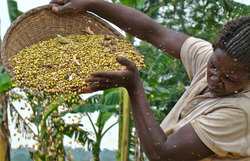By Norbert Mao
The long term effect of this pivotal legal amendment will be underdevelopment, not development.
Once again the contentious issue of compulsory land acquisitions is back on our agenda.
The beneficiaries of this state-led and coercive measure will result in dispossession of land owners for the benefit of the government, private companies or individuals. Simply put, government proposes to make it easier to seize land for what it calls ‘public use’.
The emphasis is on infrastructure and public services but there is suspicion that there is a hidden sinister motive. Once bitten twice shy! If the amendments pass, we shall see more forceful evictions, destructions of homes and crops. Affected individuals and communities will be excluded from decision making. The long term effect of this pivotal legal amendment will be underdevelopment, not development.
Let’s face it. Competition for land is intensifying and government with its financial and coercive resources has stepped in marching at the head of an army of private interests disguising their profit motive behind a veil of altruism.
Some of us have been accused of fear-mongering but if history can teach us anything, this is but the tip of the iceberg. It is a Trojan horse that will be a harbinger for land grabs. After all land grabbing has been going on. A 2011 Oxfam report says about 20,000 farmers were evicted from a government-owned forest reserves in Mubende and Kiboga districts in order to facilitate a project by New Forest Company, a private British agroforestry company.
For its troubles, Oxfam was threatened with expulsion. According to Oxfam, in the last 15 years, some 227 million hectares of land worldwide (equivalent to the land mass of the entire Western Europe) has been acquired from landowners in the developing countries. Land grabbing is a clear and present danger.
Defenders of land acquisitions claim residents get access to roads, telecommunications and schools. Are these fringe benefits enough justification for mass evictions?
In terms of food security, large scale farms focus on mono-cropping and the use of machinery.
This lessens demand for farms labour and is also a threat to food security as traditional food crops get neglected.
The so called investors also tend to renege on their promises to cater for the displaced squatters or provide social services. Enforcement of promises is weak because there is a tendency for local elites to be in the pockets of the investors. That said, responsible investment can help uplift the lives of the poor and stimulate development by creating jobs, bringing services closer to the people and improving livelihoods.
But in the absence of a trusted land policy the docket of lands is now jinxed. Going by the fate of her predecessors, new Minister of Lands, Betty Amongi, her good intentions, enthusiasm and exuberance notwithstanding has been handed a poisoned chalice. If she doesn’t take precautions she will laugh all the way to an early political grave.
Here are five reasons why Ugandans should resist the proposed amendments of the land law:
First, it is a violation of human rights. The right to own property is a sacred right. The amendments undermine security of tenure. Second, it undermines the principle of informed consent which should come without coercion and before the said acquisitions.
Third, in promoting the proposed amendments, the public interest is waved in the face of citizens. Long term social and economic impact of coercive land acquisitions are being ignored. Fourth, our experience with land acquisitions has revealed a consistent trend of opaque dealings and lack of transparency in terms of entrenched written contractual obligations as to job opportunities and equitable sharing of benefits. Fifth, even while arguing altruistic motives, the context of the land acquisitions reveal lack of inclusive participatory planning and strong institutional oversight by the national legislatures.
I say the current legal provisions are adequate. Government should not provoke citizens. You can take everything from citizens but touch their land and an inferno will follow.














